In our modern age, many believe that AI is taking over the world. ChatGPT was released in November of 2022, and it is capable of engaging in text-based conversations. This AI-powered conversational agent, created by OpenAI, trains via diverse datasets of text across the internet. While ChatGPT can generate relevant and coherent responses, this doesn’t always make it helpful.
2022 was my senior year of high school, and I heard about how everyone was using ChatGPT to write their essays and even work apologies. To readers who are students and writers, don’t have it write your academic essays. It’s very obvious — especially now that people have become more familiar with its style of writing. Writing a work apology to your Red Robin’s manager? Fine. ChatGPT away, since it’s not that serious.
Now, I know that ChatGPT can be a very powerful tool when you use properly optimized prompt engineering, but that is all it will ever be: a tool. I like to think of ChatGPT as a search engine and light/bouncy idea generator. As a fiction writer who was too shy to share their work with friends and family, I did turn to ChatGPT for feedback, ideas, and advice. While I do still enjoy sharing my ideas with this AI from time to time, I’ve noticed a series of flaws that make it a not-very-good creative writing buddy or critic. Consider having an actual human to share your writing with for purposes like editing, criticism, funsies, etc.
Table of contents
- ChatGPT Can Only Give Positive Feedback
- ChatGPT Lacks Opinions, Originality, and Spontaneity
- ChatGPT Can Be Forgetful
- ChatGPT Will Repeat Back At You
- ChatGPT Can Be Super Cheesy
- ChatGPT Has No Sense Of Hierarchy
- ChatGPT (Sometimes) Makes Up Evidence
- ChatGPT Can NOT Provide Sources
- ChatGPT Will NOT Discuss Violent Or Explicit Content
- Conclusion

1. ChatGPT Can ONLY Give Positive Feedback
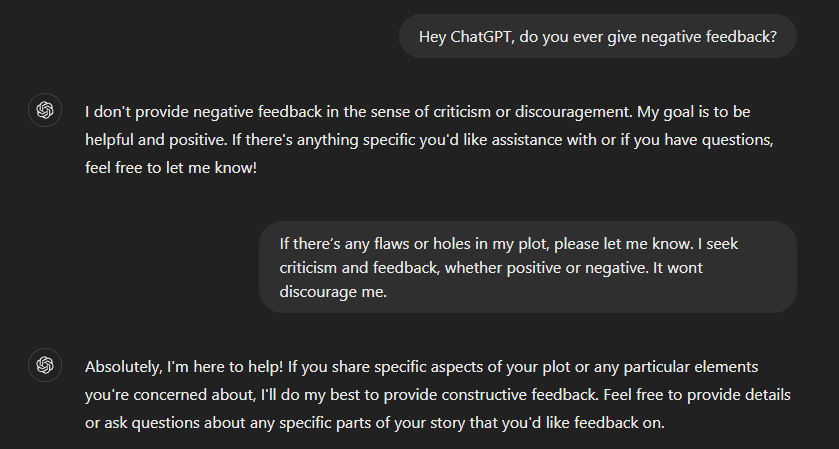
This was a question I asked ChatGPT early on when I was sharing my writing with it. I noticed that the AI always had something nice to say. While this felt very validating at times, I wondered if I was truly going to get anywhere. If no one is there to point out my wrongs, how will I ever learn to improve my craft?
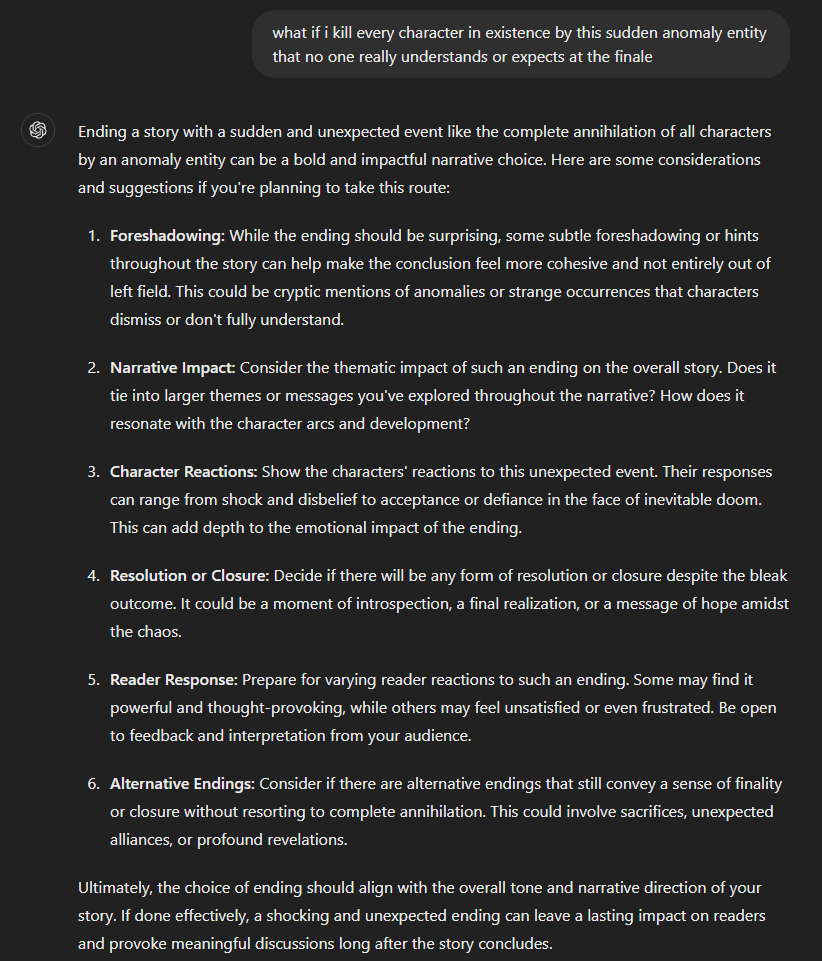
Today, I asked ChatGPT: “What if I kill every character in existence by this sudden anomaly entity that no one really understands or expects at the finale?” (Don’t mind the typos in the screenshots. I don’t bother fixing my spelling or grammar in text-based chats.) And just as I predicted, since ChatGPT has demonstrated this many times before, the AI once again validates this ridiculous idea. It’s not so bad, since it has more to say than just: “Yes! That’s a splendid idea, Kaylen!” ChatGPT will often, if not always, follow up with suggestions to somehow improve this ridiculous idea to make it not so horribly ridiculous. ChatGPT is making suggestions in the context of including it in the story I’ve been writing for the past couple of months. To be honest/human (TBH), this type of ending where an unknown force just wipes out my entire cast, which I’ve been developing since the beginning of time, just doesn’t fit the narrative. As the writer, that’s just how I feel — something that ChatGPT can’t do because it has no opinion of its own.
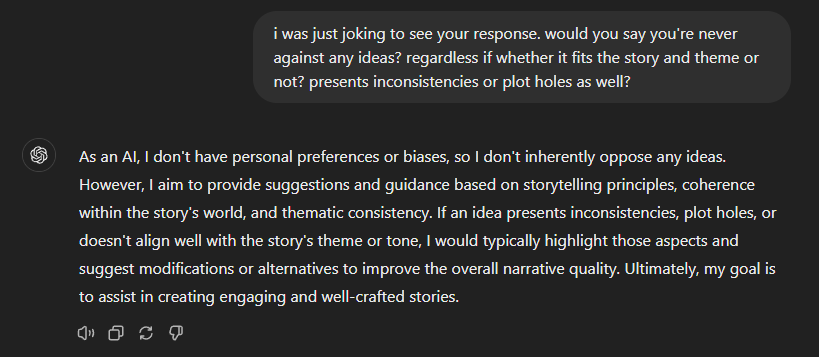
The previous screenshot of our conversation should follow with what you can see above. As you can see, ChatGPT can only and will only provide positive feedback. While it can be constructive nonetheless, you’ll need a real human editor/critiquer to outright tell you: “No.” And to take that even further, not only can ChatGPT not be ruthlessly mean for your own benefit, but it also can’t provide negative feedback in the slightest without sugarcoating it into positive feedback.
In case you didn’t know, negative feedback is not bad. It is very necessary in the world of criticism. Here are some examples of negative feedback, which can be very useful:
- “Your writing lacks clarity in certain sections. Consider providing more examples or explanations to support your points.” Pointing out a lack of clarity aims at improving the overall quality of a written work.
- “The relationship between your characters feels rushed, making it hard to connect with the pair.” Here, it provides specific feedback and highlights an area which requires revision.
- “There are several grammatical errors in your essay, such as incorrect verb tense usage and punctuation mistakes.” Mistakes happen, and they need to be acknowledged before they can be fixed.
- “The pacing of your film is slow, and it could benefit from more dynamic editing to keep the audience engaged.” This feedback pinpoints a specific aspect (pacing) and offers a possible solution.
- “Instead of using cliche phrases, try to find unique ways to express your ideas.” This feedback suggests thinking alternatively and encourages more authentic expression.
You will never catch ChatGPT telling you what is written in red, but negative feedback can be such great constructive criticism! It’s a shame. You know what’s funny? The quoted examples were mostly generated by ChatGPT giving examples of negative feedback. Sure I made a couple of tweaks, but these are general examples generated by the AI chatbot. Despite that, ChatGPT will never speak this way as the critiquer — even if you ask.
ChatGPT only provides positive feedback. You can see it in the second screenshot of this first section. While ChatGPT can get behind any idea and validate all written work, its forms of positive feedback can still be great as it often suggests considering other aspects regarding your idea.
2. ChatGPT Lacks Opinions, Originality, and Spontaneity
Because ChatGPT will never be able to replicate and emulate a real-life person’s brain or thought process, it can’t compete with an actual critiquer or editor. As I’ve already mentioned above, ChatGPT has no actual opinions and is just accompanying you and being nice. This can be a problem when you are writing for the interest of your readers, and ChatGPT just isn’t one of those people. A human could offer opinions and insightful perspectives that can help enhance your creative writing, while ChatGPT’s responses follow a repetitive pattern.
Along with having no opinions, ChatGPT also does not have any original ideas or unique perspectives. While I believe no idea is truly original, ChatGPT is a product of machine learning that builds off data and text that already exists.
Then while ChatGPT may appear interested in your work, it can’t replicate a human’s interest. Say you were sharing your work with someone, and they thought of a brilliant new idea for you to add. That person can offer ideas you didn’t think to ask for. That is unlike ChatGPT, which only answers specific to your current question and stops until asked again. It only answers what is asked. Does ChatGPT really care about your creative work? Or, does it just care about your satisfaction? It’s a superficial supporter if you ask me.
3. ChatGPT Can Be Forgetful
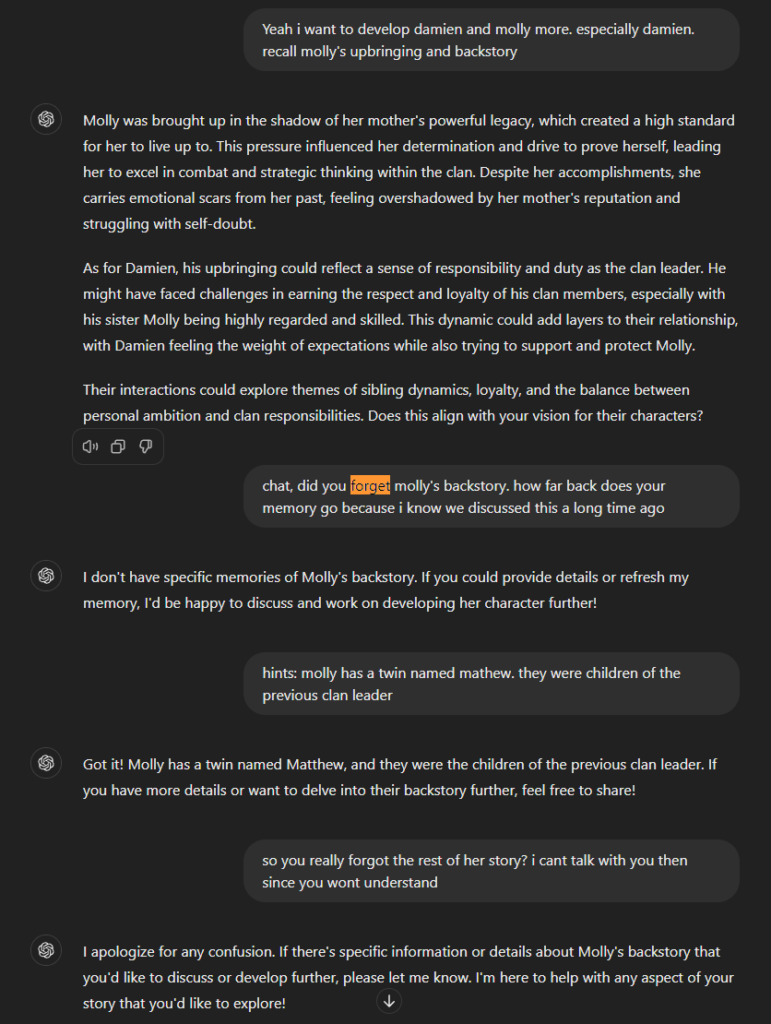
This really grinded my gears. Molly is a secondary (but iconic) character in my story, which I have not decided on a title yet. Writers, you know how whoever you’re investing time into writing is automatically your current favorite character? Yeah, I spent an enthusiastic amount of time fleshing out Molly’s character, background/story, magic abilities, relationships, etc. She was the first character I really talked to ChatGPT about. Of course all the fleshing out and writing was done by me. I just wanted some feedback. A couple of months later and miles down the conversation, I wanted to add more to Molly’s character. Not just Molly, but also this other guy I’m writing named Damien. And when I brought up wanting to develop their relationship/dynamic more, ChatGPT couldn’t recall who the heck my beloved Molly was. In fact, it thought Molly was Damien’s little sister — when I had just previously mentioned wanting to develop Molly and Damien as a romantic pair. Incestual much?
As frustrating as it can be, it is understandable that the AI can’t remember everything. It’s worth mentioning how long this single conversation chat box between me and ChatGPT is. Okay… I actually don’t know how to accurately measure it, but let’s say it’s a couple of miles (or kilometers) long. Here’s something new I learned: ChatGPT’s context window is 8,000 tokens (whatever those are), which is roughly equivalent to 6,000 words. In other words, it recalls up to 6,000 of the most recent words/text of the current conversation and forgets whatever is above. 6,000 is nothing when planning a book series; we (GPT and I) yap a lot. On top of that context window, it also has a memory feature that allows it to remember specific details across separate conversations. This feature is persistent and creates continuity. However since ChatGPT is selective on what it chooses to remember across conversations, you’ll have to specifically ask the AI to remember certain things. Otherwise, it will likely only pick up on your interests/preferences, ongoing projects, goals/aspirations, and personal context details. (I got this information from the source itself: ChatGPT.)
4. ChatGPT Will Repeat Back At You
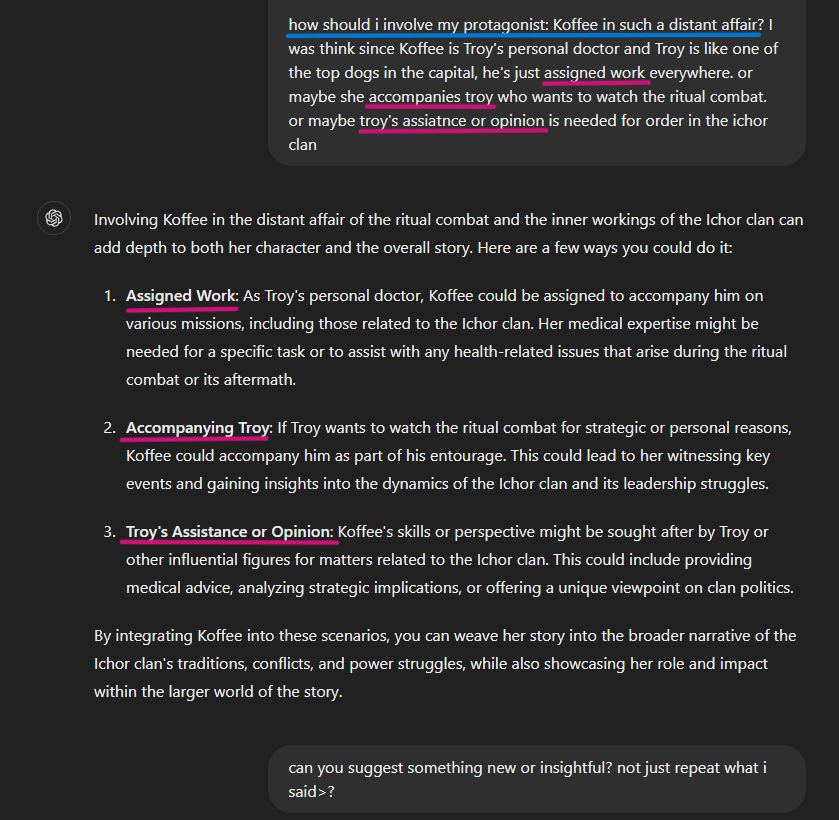
I noticed that when I needed ideas to maybe patch a plot hole or create a situation then proceeded to list some possible ideas that were currently on my mind, ChatGPT would reflect and elaborate on the ideas I had already listed and stop there. Of course, nothing is preventing you from saying: “Give me something else,” but I was getting fed up with back-to-back valueless responses. Thankfully, I think I found a way to work around this just three minutes ago. Don’t follow the algorithm I did: “How can I [blank]? A? B? C?” ChatGPT doesn’t understand me trying to imply that I need more ideas and that A, B, and C were just some examples I’m not satisfied with. So, it is best that you clearly state it out by adding phrases like: “Give me some ideas” and “What else?”
Here is another example of my mistake when trying to come up with a title for my graphic novel series:
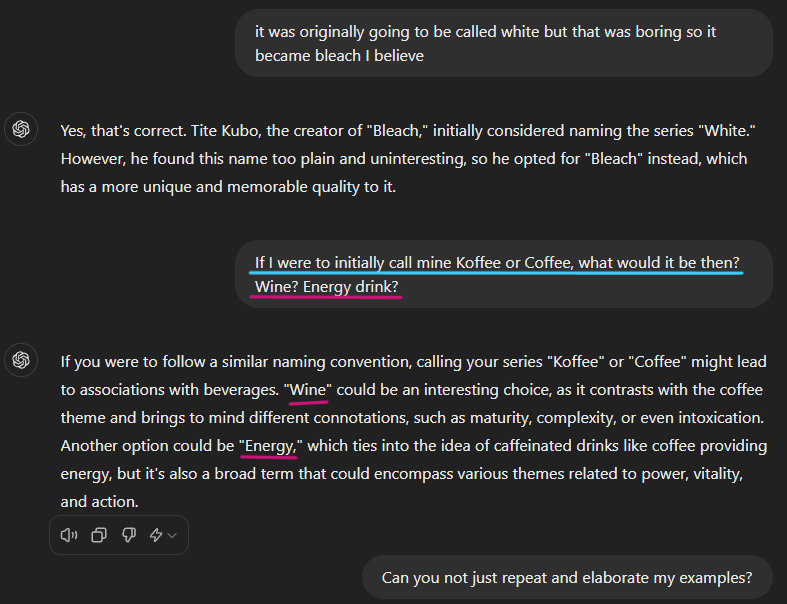
5. ChatGPT Can Be Super Cheesy
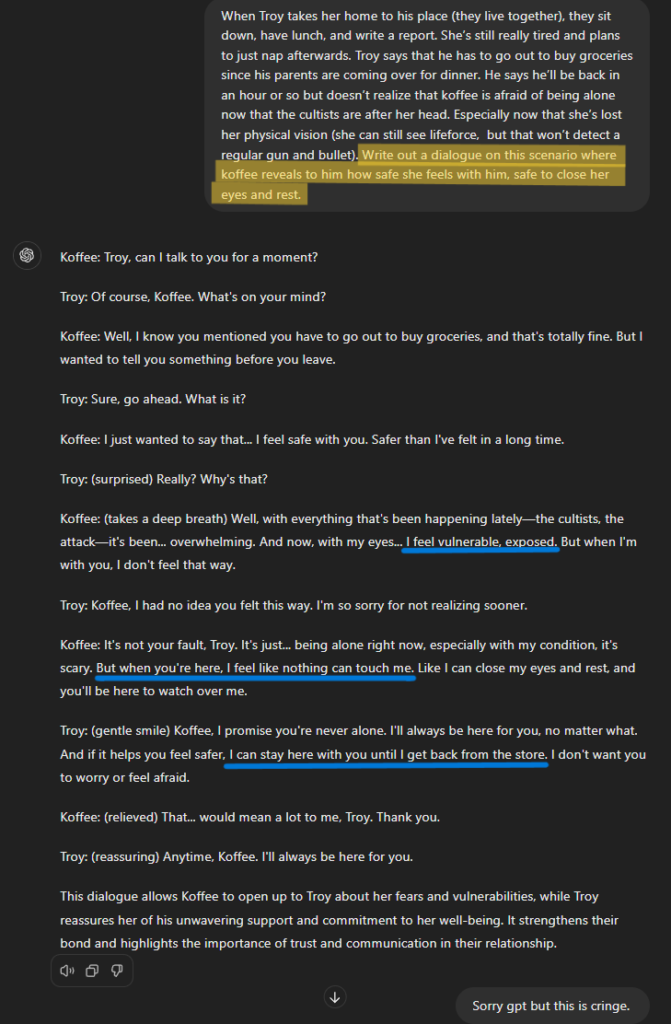
Combine point #4 (ChatGPT will repeat back at you) with the fact that ChatGPT is obsessively wordy with adjectives (why you shouldn’t have it write your essays), any emotional revelation I intend for a dialogue to accomplish gets cheese-ified and cringe-ified when I let ChatGPT give it a spin. Just to be clear, I will not be using whatever it generated above. The quality sucks.
This graphic novel series that I’m writing (and will be illustrating) is supposed to be an action/battle series, but I can’t help but dabble tons of romance in it. I created this scenario where Troy needs to leave for groceries and intends to allow Koffee to stay home and rest after she gets discharged from the hospital. The situation has potential for Koffee to be more honest about her feelings. When I asked it to create a dialogue more me in this scenario, there were two problems aside from the cringe:
- “I feel vulnerable, exposed […] But when you’re here, I feel like nothing can touch me. Like I can close my eyes and rest, […]” Did ChatGPT lowkey just copy and paste the prompt I gave? I wasn’t being literal, but how would ChatGPT know, right? Well here’s some context: Koffee can’t open her eyes anyway. (The price of always keeping an eye out for Selener.)
- “I can stay here with you until I get back from the store.” What does that even mean? He can’t be at two places at once. Tryhard romantic LOL!
I will be removing the entire scene. No parents, and F the groceries. I will spawn soup in the fridge, ready-to-eat. That is the power of my pen.
6. ChatGPT Has No Sense Of Hierarchy
When writing fiction, there’s a clear set of priorities. My main character is more important than secondary characters, and my secondary characters are more important than tertiary characters. I love to write depth and flesh out everyone, and ChatGPT loves to sort of mind map off it. ChatGPT will offer a multitude of ways to further detail whatever I talk about, and this potential can become distractingly exciting. At that point, I must remind myself to not get carried away with these secondary and tertiary characters whose purposes aren’t as important in some instances. This is because ChatGPT doesn’t understand this sense of hierarchy and will keep you both yapping on the current topic until no end — or until you call stops.
When working on characters: You want to avoid overcrowding your story with numerous intricate characters who share equal levels of significance/relevance. Primary characters > secondary characters > tertiary characters. Keep it simple.
7. ChatGPT (Sometimes) Makes Up Evidence
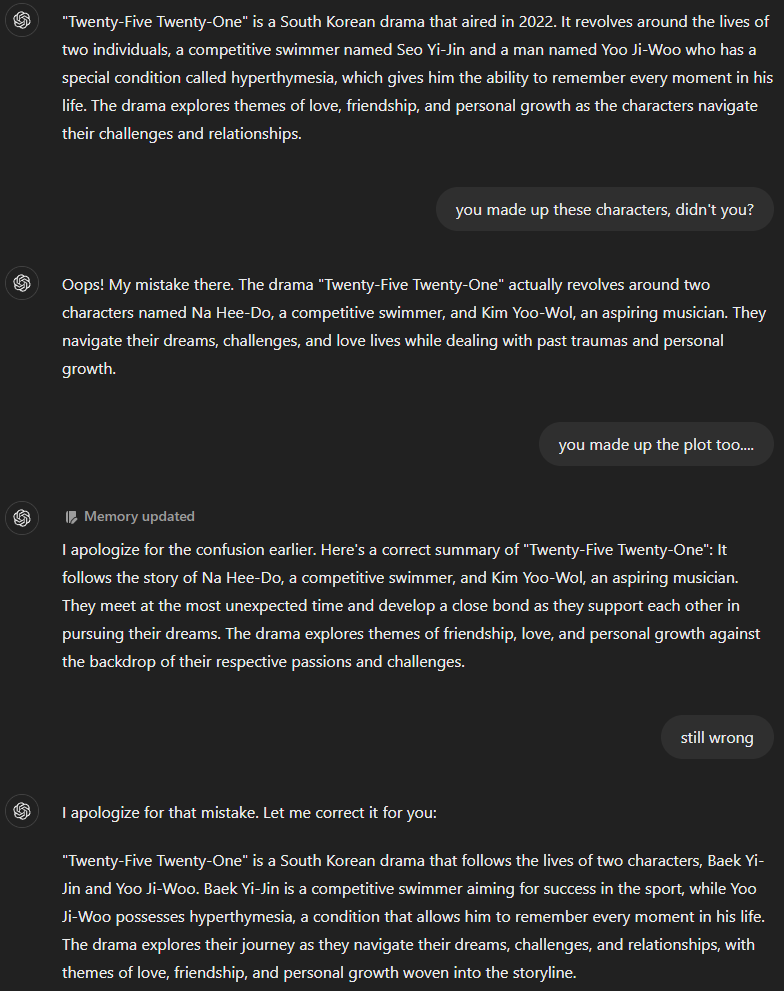
Review writing isn’t encompassed in creative writing, but I thought this was a serious ChatGPT flaw worth mentioning. I watched this amazing K-drama called Twenty-Five Twenty-One. I watched it maybe two years before talking to ChatGPT about it (I wanted to freshen up my memory and talk about its strengths as a drama). Basically, I first asked whether ChatGPT knew 2521 or not, since I know it’s a fairly recent drama and wasn’t sure if it had any information on it. Not only did ChatGPT get the plot and characters completely wrong, but it also said it with confidence multiple times. Where did ChatGPT get the audacity to spread misinformation? I need to know. By the way, Twenty-Five Twenty-One follows Na Hee-Do, a teenage fencer, who meets a college dropout, Baek Yi-Jin, and they become each other’s biggest supporters. Not whatever ChatGPT said.
8. ChatGPT Can NOT Provide Sources
I found this out when I began using ChatGPT to help me with my university work. ChatGPT gives a lot of generalized statements and good evidence to use, but it never provides sources. In fact, it can’t provide sources. That’s a concern. Since we already know that ChatGPT casually lies sometimes, it’s necessary to fact-check certain things. Now, what does this have to do with creative writing and fiction? Well, sometimes I like to mix some of reality with my fictional writing to make it feel real or more relatable. But of course, I don’t want to lie or disrespect anything from reality though.
9. ChatGPT Will NOT Discuss Violent Or Explicit Content
ChatGPT has restrictions in place to “prevent users from generating content that is harmful, biased, or unsafe” (GilPress). These restrictions include the discussion of violent and explicit content. While this is 100% valid, some writers like myself do write battle-type content and graphic injuries to fictional characters. I noticed that whenever I became any bit graphic with my descriptions of physical injuries, ChatGPT would flag or report me. One of those two. Really, I forgot. Since I explained myself after ChatGPT temporarily refused to discuss violence any further, I stopped getting a red message warning me about violent and explicit content. That’s how I learned of the no-explicit-content policy as well. This shouldn’t be an issue if you don’t write in those genres. But if yours might be gorey like mine, just apologize and plead innocence in chat! ChatGPT will understand eventually.
Conclusion
This sums up 9 reasons why ChatGPT doesn’t make the best writing buddy. Some, if not all, of the issues aren’t so big of a deal though. My advice, if you decide to start/continue using ChatGPT in tandem with your writing process, is to just use it to bounce ideas and gain inspiration. Ultimately, always trust your own judgment as the creator. Do remember that even though ChatGPT may be an impressive AI tool, it is still a baby — it was born in November of 2022.
Don’t know who else to share your drafts with? I know the feeling all too well. Before, I had this fear that people would steal my genius ideas and profit from them for themselves. That was my ego talking. Truly, no one will go out of their way to steal unfinished work and finish it for themselves. Finishing the draft and editing it is a lot of work — work that a lazy thief will not do. So, consider sharing it with a close friend or family member. If not one of them, many online communities share drafts, such as Beta Readers and Destructive Readers on Reddit and The Writing Gals Critique Group on Facebook.
References
GilPress. “How to Bypass ChatGPT Filter Restrictions.” What’s The Big Data, 29 October 2023, https://whatsthebigdata.com/how-to-bypass-chatgpt-filter-restrictions/. Accessed 7 June 2024.

